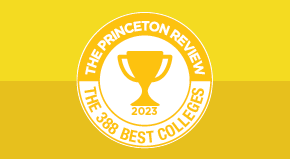Is your high school hosting a college fair? College fairs are terrific opportunities to collect admissions information on potential schools and help you to narrow down your options for your college search! Read on to learn how to make a great first impression on college reps and get the most out of your college fair.

What Do You Do At College Fairs?
College fairs are events that bring admissions officers from various colleges and universities to high schools, convention centers, and community spaces to meet with and answer questions from students and parents. In a single evening, high school students get face time with colleges from around the country and those colleges, armed with brochures and catalogs, can reach a cross-section of students from a local area.
With all the students vying for the attention of a limited number of college representatives, college fairs can be overwhelming and intimidating for some students and their parents (NACAC National College Fair events, for example, can draw reps from upward of 200 schools!). The key to using the fair to your advantage is to arrive prepared:
1. Make a College Fair Game Plan
Before you arrive at the fair, do your research. Which college representatives do you want to meet? What do you know about their college already, and what more do you want to know? Depending on your priorities, you might decide to focus your attention on schools that have a strong program for your intended major or look into scholarship information to help pay for college.
2. Ask Colleges Great Questions
If a college rep can clearly see you are interested and familiar with the school, that impression can have a huge impact. A few thoughtful, well-researched questions are best. If you can find the answer on their website (like, “Where is your school located?”), ask something else. Try this list of college questions to get started.
3. Dress the Part
You don’t need to rent a tux, but you don’t want to look like you just peeled yourself off the couch, either. College reps will remember students who seem well put-together and who demonstrate serious interest in their schools. Show them you’re interested by smiling, making eye contact, and being polite. Wear comfortable shoes and carry around bottled water. You’ll be doing a whole lot of walking and talking.
Read More: 9 Tips to Get the Most from College Visits
4. Go Off Script
It’s okay to approach a school you are unfamiliar with. Smart students seize the opportunity to learn about new schools, understanding that one of these freshly discovered colleges might be the perfect place for them. The college reps will be thrilled to tell you about their school, and you should be prepared to talk about yourself and what you are looking for.
5. Get Contact Information and Use It
When you’ve asked all your questions and (hopefully) feel good about the college rep you just spoke with, be sure to ask them for their contact information and use it if you have more questions after you’ve left the fair.
Helpful Questions to Ask Colleges During A College Fair
Admission counselors attend college fairs to help you with any questions you may have about their school to see if it is the right college fit for you. Here are a few sample questions to help you uncover key information. Remember to ask anything specific to your needs and interests and prioritize your questions in order of importance.
- What do students like most about your school? What is the biggest complaint from students?
- What kinds of students are happiest at your school?
- Where do students hang out on campus? Do students mostly live on or off campus?
- What financial aid programs does your college offer?
- What academic programs are the most popular at your college?
- Do admission officers make decisions solely on numbers and stats, or do extracurricular activities truly matter at your school?
- How would you describe the academic pressure and workload?
- How does your career planning department compare to other colleges/universities?
- What are the faculty like and how accessible are they outside of class?
- Are there internships available specific to my major?
- Is there job placement help for graduates?
- Are you able to give me the names of a few students that I can talk to about their experience at your school?
Read More: Start searching for your dream school today!
What to Do After A College Fair?
After attending a college fair, students often wonder what to do next with all of the information and contacts they’ve gathered. Sort through and organize the information you and your parents gathered and any notes you took at the fair. Within a day or two, while the conversation is fresh in your mind, send the college reps you spoke with a thank-you email, let them know you’re interested in their school, and ask any follow-up questions you have. When contacting colleges, keep it short, polite, and professional.
Schedule a few campus visits for your top schools and lastly, congratulate yourself! Navigating the college fair grounds is no easy feat. You’re well on your way to finding your best fit college.
Read More
Explore Colleges For You
Connect with our featured colleges to find schools that both match your interests and are looking for students like you.
Get Started on Athletic Scholarships & Recruiting!
Join athletes who were discovered, recruited & often received scholarships after connecting with NCSA's 42,000 strong network of coaches.
Best 388 Colleges
154,000 students rate everything from their professors to their campus social scene.



